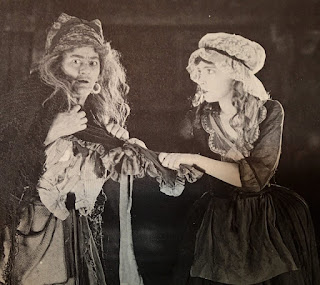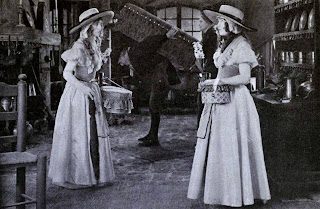Orphans of the Storm (1921)
Orphans of the Storm (1921)
Director: D.W. Griffith Writers: Adolphe d'Ennery (novel) Eugene Cormon (novel) D.W. Griffith used this movie as a means of commenting, obliquely, on contemporary politics of his time. He drew parallels between the anarchist mobs that overthrew the French aristocrats, and what he says in opening titles to the film are the present American dangers of succumbing to the kind of "anarchy and Bolshevism" he perceived in the recent Russian Revolution. It is a great historical irony that those Bolsheviks Griffith railed against were quite smitten with the director's incomparable ways of generating film tension in crosscutting as well as his cinematic means of conveying good and evil via sophisticated editing and framing techniques. As the father of film syntax Griffith was an enormous influence on the Soviet filmmakers Sergei M. Eisenstein and Vsevolod Pudovkin, who were inspired by many of his films including the anti-Bolshevik Orphans of the Storm (1921). Lillian Gish was thrilled to be invited to the White House by President Warren G. Harding following the premiere of Orphans of the Storm (1921). Lillian Gish first suggested D.W. Griffith film the enormously popular play "The Two Orphans," which had been translated into 40 languages, thinking of her sister Dorothy Gish in the role of Henriette. Interestingly, Griffith cast Dorothy as Louise, the passive blind victim, when it was Lillian who was best known for playing helpless heroines. Most who knew her would attest that Dorothy was the more vivacious and strong willed of the two sisters. Lillian had written of her sister in 1927 "She is laughter, even on the cloudy days of life; nothing bothers her or saddens her or concerns her lastingly." The fountain in the Bel-Air scene was made of marble and filled with cider, because water would not photograph with the sparkle needed to suggest wine. Included among "The 1001 Movies You Must See Before You Die", edited by Steven Schneider. For this film, which was to be his last box-office success, Griffith adapted a successful 1874 theatre play 'The Two Orphans', itself an adaptation of the French play 'Les deux orphelines' by Adoplphe d'Ennery and Eugene Cormon. Despite the subtitle 'An Epic Film of the French Revolution', the film is not about the French revolution, but follows the story of two young girls at the time of the French Revolution. Griffith demonstrates again with this film his mastery of the nascent cinematographic language in particular with the quasi-systematic use of different shots, from wide shot to close-up to present each scene from different angles and draw the attention on certain details. The narrative thread is mostly chronological, with cross-cutting between actions of the various characters and flashbacks to replace memories. As often with Griffith (see Intolerance or Way Down East), the suspense is well kept throughout the film and there is a spectacular scene at the end to save the heroin, here a cavalcade through Paris remarkably filmed from different angles, notably with a spectacular tracking shot. A large part of the charm of the film comes from the acting of the two Gish sisters, who played here together for the last time and it is quite obvious that Dorothy was as gifted as Lilian. Supporting characters are rather archetypal: the good and the bad aristocrat, the good and the bad revolutionaries, the nasty ugly lady and the comical valet. Sets and costumes are very impressive and, combined with well filmed crowd and battle scenes with a large number of extras, keep the viewer's attention focussed despite the length of the film. Lillian Gish ... Henriette Girard Dorothy Gish ... Louise Girard Joseph Schildkraut ... Chevalier de Vaudrey Frank Losee ... Count de Linieres Katherine Emmet ... Countess de Linieres Morgan Wallace ... Marquis de Praille Lucille La Verne ... Mother Frochard Sheldon Lewis ... Jacques Frochard Frank Puglia ... Pierre Frochard Creighton Hale ... Picard Monte Blue ... Danton Sidney Herbert ... Robespierre Lee Kohlmar ... King Louis XVI Marcia Harris ... Henriette's Landlady Adolph Lestina ... Doctor Kate Bruce ... Sister Genevieve Flora Finch ... Starving Peasant Louis Wolheim ... Executioner Kenny Delmar ... The Chevalier - as a Boy James Smith ... Dancer Herbert Sutch ... Meat Carver at Festival Rose Smith ... Dancer
Director: D.W. Griffith Writers: Adolphe d'Ennery (novel) Eugene Cormon (novel) D.W. Griffith used this movie as a means of commenting, obliquely, on contemporary politics of his time. He drew parallels between the anarchist mobs that overthrew the French aristocrats, and what he says in opening titles to the film are the present American dangers of succumbing to the kind of "anarchy and Bolshevism" he perceived in the recent Russian Revolution. It is a great historical irony that those Bolsheviks Griffith railed against were quite smitten with the director's incomparable ways of generating film tension in crosscutting as well as his cinematic means of conveying good and evil via sophisticated editing and framing techniques. As the father of film syntax Griffith was an enormous influence on the Soviet filmmakers Sergei M. Eisenstein and Vsevolod Pudovkin, who were inspired by many of his films including the anti-Bolshevik Orphans of the Storm (1921). Lillian Gish was thrilled to be invited to the White House by President Warren G. Harding following the premiere of Orphans of the Storm (1921). Lillian Gish first suggested D.W. Griffith film the enormously popular play "The Two Orphans," which had been translated into 40 languages, thinking of her sister Dorothy Gish in the role of Henriette. Interestingly, Griffith cast Dorothy as Louise, the passive blind victim, when it was Lillian who was best known for playing helpless heroines. Most who knew her would attest that Dorothy was the more vivacious and strong willed of the two sisters. Lillian had written of her sister in 1927 "She is laughter, even on the cloudy days of life; nothing bothers her or saddens her or concerns her lastingly." The fountain in the Bel-Air scene was made of marble and filled with cider, because water would not photograph with the sparkle needed to suggest wine. Included among "The 1001 Movies You Must See Before You Die", edited by Steven Schneider. For this film, which was to be his last box-office success, Griffith adapted a successful 1874 theatre play 'The Two Orphans', itself an adaptation of the French play 'Les deux orphelines' by Adoplphe d'Ennery and Eugene Cormon. Despite the subtitle 'An Epic Film of the French Revolution', the film is not about the French revolution, but follows the story of two young girls at the time of the French Revolution. Griffith demonstrates again with this film his mastery of the nascent cinematographic language in particular with the quasi-systematic use of different shots, from wide shot to close-up to present each scene from different angles and draw the attention on certain details. The narrative thread is mostly chronological, with cross-cutting between actions of the various characters and flashbacks to replace memories. As often with Griffith (see Intolerance or Way Down East), the suspense is well kept throughout the film and there is a spectacular scene at the end to save the heroin, here a cavalcade through Paris remarkably filmed from different angles, notably with a spectacular tracking shot. A large part of the charm of the film comes from the acting of the two Gish sisters, who played here together for the last time and it is quite obvious that Dorothy was as gifted as Lilian. Supporting characters are rather archetypal: the good and the bad aristocrat, the good and the bad revolutionaries, the nasty ugly lady and the comical valet. Sets and costumes are very impressive and, combined with well filmed crowd and battle scenes with a large number of extras, keep the viewer's attention focussed despite the length of the film. Lillian Gish ... Henriette Girard Dorothy Gish ... Louise Girard Joseph Schildkraut ... Chevalier de Vaudrey Frank Losee ... Count de Linieres Katherine Emmet ... Countess de Linieres Morgan Wallace ... Marquis de Praille Lucille La Verne ... Mother Frochard Sheldon Lewis ... Jacques Frochard Frank Puglia ... Pierre Frochard Creighton Hale ... Picard Monte Blue ... Danton Sidney Herbert ... Robespierre Lee Kohlmar ... King Louis XVI Marcia Harris ... Henriette's Landlady Adolph Lestina ... Doctor Kate Bruce ... Sister Genevieve Flora Finch ... Starving Peasant Louis Wolheim ... Executioner Kenny Delmar ... The Chevalier - as a Boy James Smith ... Dancer Herbert Sutch ... Meat Carver at Festival Rose Smith ... Dancer











































































































Comments
Post a Comment